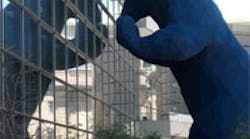“I’d like to talk about the future and what this country might look like if we make the right choices in environment and energy,” Kennedy told the AIHce audience.
Kennedy, a senior attorney for the Natural Resources Defense Council, chief prosecuting attorney for the Hudson Riverkeeper, president of Waterkeeper Alliance and the environmental advisor to Napo Pharmaceuticals, stressed that we must protect the infrastructure of our communities – nature.
“We want to create communities for children that provide richness, prosperity and health,” Kennedy said. “We’ve got to start protecting our wildlife infrastructure.”
Polluters, however, urge us to treat the planet as if it was a “business liquidation,” he explained, so we can have a few years of what amounts to pollution prosperity. “But our children are going to pay for our joy ride with polluted landscapes and poor health,” he said.
The Cost of Coal
When in West Virginia recently for a trial, Kennedy noticed the roadway he was driving on felt cushioned, almost like a carpet. What he felt was 22 inches of asphalt on the road, about five times what is be found on regular roadways. The extra asphalt is added to accommodate 90,000-pound coal trucks that can “pulverize” the road otherwise. These coal roads, Kennedy added, must be repaired every 4 years, compared to every 20 years for other highways.
“That’s a hidden cost, a hidden subsidy to the coal industry they don’t tell us about,” Kennedy said. “When they say [coal is] cheap, it’s a lie.”
Kennedy also pointed out that every freshwater fish in America now has dangerous levels of mercury in its flesh, most of which comes from the emissions of coal-burning plants. “We’re living in a science fiction nightmare in our country today,” he said. “If someone else did that to our country – poisoned every fish in our country with mercury – we’d say it was an act of war.”
There are other serious repercussions, as well, such as the 640,000 children are born every year who were exposed to dangerous levels of mercury in the womb, according to CDC. And a Harvard School of Public Health study suggested that ozone emissions from coal-burning plants kill 60,000 people a year.
“That’s one of the costs of coal they don’t tell you about,” Kennedy said. “Those impacts are imposed on all of us. They essentially are hidden subsidies in coal-burning power plants.”
Kennedy’s solution is for the United States to “de-carbonize,” and explains that any country that has done so had immediately experienced prosperity. He used Iceland, Sweden and Brazil as examples, but added that the United States actually has even more potential for clean energy. From solar power to wind power to natural gas, the United States has enough of these energy sources to provide all the energy for the nation several times over.
“We literally could switch out from coal overnight in this country without building a single new power plant,” he said. “To completely replace our system in this country [would cost] $3 trillion. Then free energy forever.”
Energy Entrepreneurs
Kennedy stressed the need for a rational marketplace that rewards good behavior (efficiency) and does not reward bad behavior (inefficiency and waste). To accomplish this, he said, the system “needs to turn every American into an energy entrepreneur.” For example, Kennedy said since his own home creates more energy than it uses, he should be able to sell the surplus. But he can’t.
“We have the capacity to take control of country back and take control of our economy,” he said. “[Free market capitalism] would promote efficiency and value our natural resources. In a true free market economy, when make yourself rich, you make your neighbors rich and improve the community. Polluters make it worse for everyone.”
Finally, Kennedy stressed that everyone has the right to use natural resources and have access to clean air and water.
“We’re not going to allow those things to be privatized … the air in children’s lungs, the fish in the water,” he explained. “We’re fighting for essential values of American democracy.”
“It’s investing in our infrastructure,” he said of environmental protections and clean energy. “It’s an investment we have to make if we’re going to preserve the future.”
EHS Today is on site in Denver for AIHce and will report on sessions, keynotes and more to provide EHS professionals with the insight they need to do their jobs well. Or, as Denver Mayor John Hickenlooper told industrial hygienists during the opening session, to “Go out and make our world cleaner and safer.”

